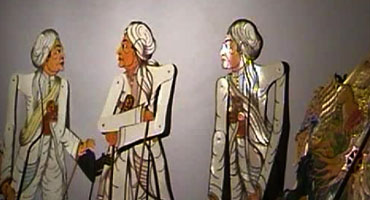
 I agree
I agree
.
Raden Saleh [Raden Saleh] (2012)
Dalang: Ananto Wicaksono
How to cite: Ananto Wicaksono ([2012] 2016), Raden Saleh [Raden Saleh], translation and notes by Miguel Escobar Varela, Yosephin Novi Marginingrum and Egbert Wits. Singapore: Contemporary Wayang Archive. Retrieved from http://cwa-web.org/en/RadenSaleh.
Summary
The painter Raden Saleh leaves for Europe so that one day he can put his craft to the service of the colonized Javanese people. Diponegoro leads a holy war against the Dutch colonizers. In an interlude, dalang Ki Ledjar Subroto discusses his views on wayang and tradition with a young theatre artist. Diponegoro is tricked by the Dutch and captured. Raden Saleh paints this scene, which would become one of his most famous works.
Story: History
Music: Electronic Music, Contemporary Gamelan, Hip Hop
Space: Gedebog, Kelir
Performers: Single Dalang
Puppets: Modified Traditional
Language: Indonesian
Recording details
Notes: This performance was made for the opening of the exhibition Raden Saleh dan Awal Seni Lukis Modern Indonesia on 3 June 2012.
Produced by: National University of Singapore and Indonesian Visual Art Archive
Recording place: Galeri Nasional, Jakarta
View the metadata record for this resource.
Translation and notes by Miguel Escobar Varela (MEV), Yosephin Novi Marginingrum (YNM) and Egbert Wits (EW).
1. The young Raden Saleh was first taught in Bogor by the Belgian artist A.J. Payen. Payen recognized the young man's talent, and persuaded the colonial government of the Netherlands to send Raden Saleh to the Netherlands to study art. He arrived in Europe in 1829 and began to study under Cornelius Kruseman and Andreas Schelfhout EW.2. Khalifah [successor or steward]. As a title, it most commonly refers to the leader of a Caliphate, but is also used as a title among various Islamic religious groups and orders EW.
3. In 1801, De Kock joined the Batavian navy. By 1821 he commanded a military expedition to Palembang to suppress a local uprising. Later, as Lieutenant Governor-General (1826–1830), De Kock led the fight against Prince Diponegoro in the Java War EW.
4. Garningsun stems from the Dutch word garnizoen, which is equivalent to garrison in English. It is a military term for troops stationed in a fortress or town to defend it EW.
5. Godverdomme [goddammit] is a well-known Dutch curse word MEV.
6. This fragment is spoken in Dutch EW.
7. A benteng stelsel is a simple fort used both for attack and defense, built using local materials EW.
8. Ibu Pertiwi [mother nature] MEV.
9. Jemek Supardi (1953) is the most famous pantomime artist in Yogyakarta MEV.
10. Many male artists - especially dalang - wear gemstone rings in Indonesia MEV.
11. Ledjar Soebroto is the maker of the wayang puppets used in this play MEV.
12. Kěprak is a metallic plank placed on the puppet box. The puppeteer hits it with a wooden mallet cempala [wooden mallet] in order to add accents to fight scenes MEV.
13. This is an example of Sundanese Jaipongan music.
14. Sentot Ali Basya Abdul Mustafa (1807 - 1855) was a member of the Yogyakarta royal family who sided with the resistance against the Dutch EW.
15. This verses are known as Aměnangi Jaman Édan [The Crazy Times are Upon Us]. They correspond to a prophecy included in the Serat Kalatida (1860), written by Raden Ngabehi Ranggawarsita (1802-1873), the great 19th Century poet of the Surakarta Court YNM.
16. Uripé mung mampir ngombé [life is only a stop for a drink] is a Javanese saying that alludes to the transience of life MEV.
17. Samuel Indratmata (1970) is a visual artist and muralist from Central Java MEV.
18. Nasirun (b. 1965), is one of the foremost painters of Indonesia MEV.
19. Budi Pramono was the composer for this performance MEV.
20. The dalang is the grandson of Mbah Ledjar MEV.
21. Irina is the name of one of the people from the Goethe Institute in Jakarta that sponsored this performance MEV.
22. Ledjar Soebroto uses a slang expression bayangin deh! which is often used by young people, causing the audience to laugh MEV.
23. The previous performance had to be limited to 45 minutes, since it was part of an exhibition on Raden Saleh's work at the Galeri Nasional in Jakarta MEV.
24. The dalang is possibly talking about visitors to the exhibition MEV.
25. Gotong royong [to bear a heavy weight in a group; mutual aid] is a philosophy of collaboration and mutual support MEV.
26. Rendra Bagus Pamungkas is an actor and writer MEV.
27. Wayang purwa [classical wayang] refers to performances based on the Mahabharata and Ramayana epics MEV.
28. Luwak or civet coffee refers to the coffee cherries that have been eaten and defecated by the Asian palm civet. Luwak is famously the most expensive coffee in the world MEV.
29. Solasi [isolation tape] MEV.
30. Gara-gara [upheaval] is the name often given to the comic interlude, which ends here MEV.
31. Raden Banteng Wareng was reputedly a famous patriotic soldier in the army of Diponegoro. Nasirun is a famous painter see note 19 MEV.
32. A Residen was the head of a certain area (comprising multiple districts) during the Dutch colonial times EW.
33. Dutch. Dankuwel is a polite way of expressing thanks EW.
34. Batavia was the name of Indonesia's capital during the Dutch colonial rule, it corresponds to present day Jakarta EW.
35. Getarkan nafas literally means to make someone's breath vibrate EW.
36. Mbah Ledjar singing. This song is taken from the first part of the Wedhatama, written by K.G.P.A.A. Mangkunagara IV YNM.
The honorifics in the original languages were retained in the subtitles. In Javanese and Indonesian, speakers address their interlocutors with over 40 different honorifics which denote differences in their relative status and level of intimacy.
ID = Indonesian
JW = Javanese
Adik. ID. Younger brother/sister. It is used for addressing younger people, not necessarily one's relatives.
Adinda. ID. Younger sister. More intimate than adik.
Babé. ID/Betawi. Familiar form of father, commonly used in Jakarta.
Bé. ID/Betawi. Short form of Babé, father. Jakartan slang.
Bang. ID. Older brother, short form of abang. If used with non-relatives, it is has the connotation of a slang, and is somewhat equivalent to “man” in English.
Bĕndara. JW. Master.
Bibi. JW/ID. Aunt. A way of addressing/referring to older women.
Bos. ID/JW. An adaptation of the English "boss". Used either to refer to one's superior or to a friend in a joking context, for example, when a person orders others around without realizing he/she is doing so.
Bu. ID/JW. Short form of ibu, mother.
Bung. ID. Similar to bang, but slightly less formal. It might mean "comrade". The political leaders of the independence war are often referred to with this term, for example Sukarno is often referred to as
Bung Karno.
Dara. JW. Short form of bĕndara, master.
Dèn. JW. Sir, master, used to address royalty. Short form of radèn.
Dhé. JW. Short form of pakdhé, uncle.
Dhik. JW. Short form of adhik. Younger brother/sister. It is used for addressing younger people, not necessarily one's relatives.
Éyang. JW. Grandfather.
Dimas. JW. Younger brother.
Gusti. JW. Lord. Used to address superiors and Gods.
Ibu. JW/ID. Mother. Used generically to address women who are older than the speaker.
Kakang. JW. Older brother.
Kakang mbok. JW. Older sister.
Kanda. ID. Older brother. Formal.
Kang. JW. Older brother. Informal.
Kangmas. JW. Older brother.
Kaki. JW. Uncle
Kang. JW. Older brother, used generically for men older than the speaker. It is a shortened version of kangmas).
Kakak. JW/ID. Older brother/sister, used generically for people who are older than the speaker.
Lé. JW. Son, short version of tholé.
Lik. JW. Often used between friends as a slang term of address. Uncle, "little father." Short form of {paklik}.
Ma. JW. Same as pak, short form of rama.
Mbak. JW/ID. Older sister. Used generically for women who are slightly older than the speaker.
Mamang. ID. Uncle.
Mang. ID. Uncle, short form of mamang.
Mas. ID. Older brother, used generically for men who are older than the speaker. Although it is also a shortened version of the Javanese kangmas people prefer to use mas in Indonesian and kang in Javanese.
Mas bro. ID. Slang used among male friends. In a way, it is a reduplication.
Mbah. JW/ID Grandfather, grandmother. It is used generically to address people who are much older than the speaker. Short form of simbah.
Mbok. JW. Mother, short form of simbok. Used generically for women who are older than the speaker.
Mbokdhé. JW. Aunt. Literally, "big mother".
Mbul. JW. Informal term of address between close male friends.
Ndara. JW. Master.
Nduk. JW. Daughter, short form of gĕndhuk.
Nggèr. JW. Son, short form of anggèr Used generically for people who are younger than the speaker, with whom the speaker is on intimate terms.
Nimas. JW. Younger sister.
Nok. JW. West Javanese term for daughter, short form of dhénok.
Nona. ID. Miss, unmarried woman.
Paduka. ID. Your Excellency.
Pak. JW/ID. Father, used generically for men who are older than the speaker.
Pakdhé. JW. Uncle. Used to refer to a man who is older than one's father.
Paman. ID. Uncle. Used to refer to a man who is older than one's father.
Pangéran. JW/ID. Prince.
Prabu. JW. King.
Radén. JW. Master, used for royalty.
Rama. JW. Father. It can also be used to designate catholic priests when one is speaking in Indonesian.
Simbah. JW/ID Grandfather, grandmother. It is used generically to address people who are much older than the speaker.
Sinuwun. JW. Very formal way to address a man, reserved for sultans, kings and Gods.
Siwa. JW. Term for addressing older people.
Siwak. JW. Same as Siwa. Term for addressing older people.
Tholé. JW. Son
Tuan. ID. In colonial contexts, this is the way foreigners are addressed but it can also mean sir.
Wa Nĕrpati. JW. Uncle king, equivalent to the Indonesian paman raja.
Wa. JW. For addressing older people, short form of siwa.
Yayi. JW. Younger brother/sister.
Yunda. JW. Older sister.
See the Translation conventions.
Share:
in the translations or data.
